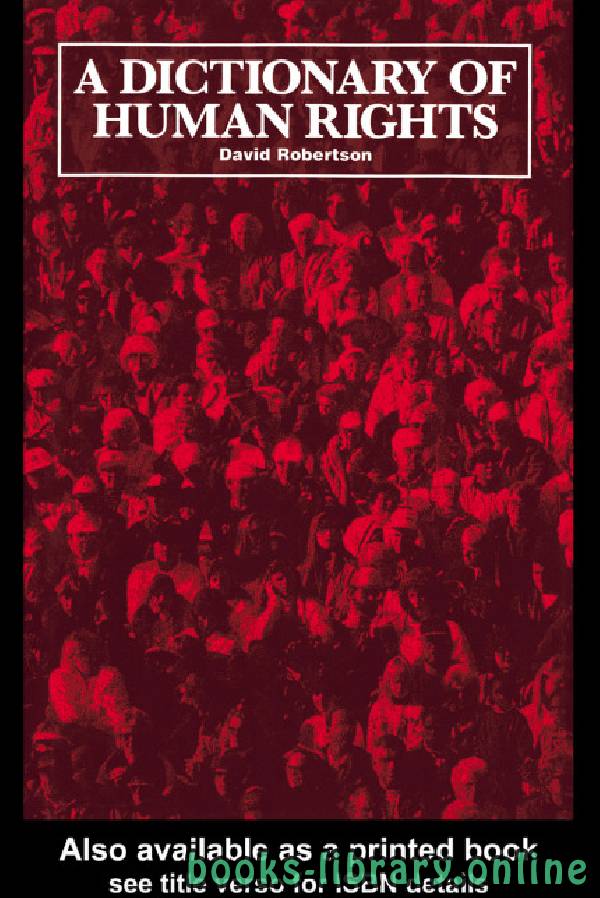📘 قراءة كتاب ِA Dictionary Of Human Rights أونلاين


These general changes have coincided, over the last 10 to 20 years, with an increasing
activism by courts in many countries. Political systems, and that of the United Kingdom
is an example, in which the courts had a rather shameful record of subservience to the
executive, are now increasingly proud of their public law. The change is international in
the true sense, as it stems from an internationalization of legal culture, rather than a
simple change that has occurred by happenstance and coincidentally in several countries.
In large part this has come about from the growing importance of supranational legal
entities such as the European Court of Justice and the European Court of Human Rights.
It has occurred also because international concern for the human rights records of many
countries became a significant factor in international relations during the 1970s and
1980s. Finally, the development has been accelerated by the collapse of the USSR and
the end of its hegemony over Eastern Europe.
In practice, observance of human rights always falls short of the ideal, and the
successful attainment of rights itself promotes demands for further rights. No text book or
survey on human rights or civil liberties published in any country is likely to be satisfied
totally with the record of that country, and it is probably a subject where criticism is
healthier than contentment. This reference book, a form of annotated dictionary, is for all
those who are not legal experts and who want to get a quick grasp of basic issues in
human rights discourse without being either blinded by the endless legal technicalities or
forced to ignore them. One cannot dismiss legal technicalities and cut through legal
language entirely, because rights basically are legal technicalities. What cannot be
expressed with some clarity in a legal document will not be preserved and protected.
Nevertheless, it should be possible to grasp the essence of the legal and constitutional
debates without actually having a thorough legal education.
There are a few necessary points of explanation. First, I have used the phrase ‘human
rights’ as though it were interchangeable with ‘civil liberties’ and ‘civil rights’, purely to
give some stylistic ease from endless repetition. There are those who think there is a
20ucial theoretical difference between the concepts, but I am not one of them, and I hope
that in the rare case where something important might follow from the distinction, the
context of my usage will make the difference clear. Similarly, I have used some analytic
concepts in slightly idiosyncratic ways as expository tools; the most important is the use I
make repeatedly of the distinction between positive and negative rights. My usage does
not accord with that of some other writers, but I have explained what I mean by the
concepts in separate entries, and have found it a labour-saving device for me in writing,
as I hope it will be in reading. Where I have elsewhere used concepts or labels other than
in the normal sense, to the extent that there is a ‘normal’ sense, I have tried to make this
clear. This is not a creative or original work, and I have not sought to establish some
particular substantive position of my own in my choice of terms. There are inevitable
choices, of selection and emphasis, that have to be made in any book such as this, and the
choices cannot be entirely neutral. The bias, if that is the right word, I am most aware of
is my own preference for taking rights to mean largely political and constitutional
entitlements and freedoms, rather than economic- and social-need satisfactions. I am
entirely aware of the school of thought that holds these latter to be more important,
perhaps causally prior to human rights of the sort on which I concentrate. For various
reasons I disagree, chiefly because however crucial economic-need satisfaction may be, I
do not believe its analysis and discussion is helped by using the very different language
of rights discourse. Nevertheless, I have attempted to give basic coverage of such ‘rights’,
especially as they are set out in international covenants. There may also appear to be bias
in the sources I have chosen to quote and take my examples from. Certainly there has
been a deliberate selection, but I hope it is not a bias in the pejorative sense. My
examples disproportionately come from the USA, from the European human rights
documents and institutions, and from the German Constitution. The reasons are twofold,
very simple, and related. I have not attempted, no one could, to give an exhaustive
account of the presence or absence and the meaning of every putative right in every
major legal system. I have, instead, tried to take examples of all the major rights claims
and arguments. For this one needs a small set of selected main sources. I have
concentrated on the ones I have because one can only fully understand the meaning and
application of legal concepts where there is a considerable amount of litigation, so that
we know what judges have made of the terms in which rights are expressed.
The US Supreme Court, the European Court of Human Rights and the German
Constitutional Court simply have produced far more and, in my view, far more thoughtful
and complex, interpretations of rights language than other potential sources. I could have
chosen others; the Canadian Supreme Court, for example, has been very active over the
last 15 years, but the Canadian Charter of Rights and Freedoms is too new to serve as
effectively as the documents and courts on which I have chosen to concentrate.Ultimately, the human rights tradition as we know it simply is the product of liberal-
تزامنت هذه التغييرات العامة ، على مدى السنوات العشر إلى العشرين الماضية ، مع زيادة
نشاط المحاكم في العديد من البلدان. الأنظمة السياسية وأنظمة المملكة المتحدة
مثال على ذلك ، حيث كان للمحاكم سجل مخجل إلى حد ما من التبعية لل
التنفيذية ، والآن نفخر على نحو متزايد من القانون العام. التغيير دولي في
بالمعنى الحقيقي ، لأنه ينبع من تدويل الثقافة القانونية ، بدلا من أ
التغيير البسيط الذي حدث بالصدفة وبالصدفة في العديد من البلدان.
في جزء كبير منه جاء هذا من الأهمية المتزايدة للقانون فوق الوطني
كيانات مثل محكمة العدل الأوروبية ومحكمة حقوق الإنسان الأوروبية.
لقد حدث ذلك أيضًا بسبب الاهتمام الدولي بسجلات حقوق الإنسان للكثيرين
أصبحت البلدان عاملا هاما في العلاقات الدولية خلال 1970s و
1980s. وأخيرا ، تم تسريع التنمية من انهيار الاتحاد السوفياتي و
نهاية هيمنتها على أوروبا الشرقية.
في الممارسة العملية ، فإن احترام حقوق الإنسان دائماً ما يكون دون المستوى المثالي
إن النجاح في تحقيق الحقوق في حد ذاته يعزز المطالب بمزيد من الحقوق. لا كتاب نصي أو
مسح حول حقوق الإنسان أو الحريات المدنية المنشورة في أي بلد من المرجح أن يكون راضيا
تماما مع سجل هذا البلد ، وربما هو موضوع حيث النقد
أكثر صحة من الرضا. هذا الكتاب المرجعي ، شكل من أشكال القاموس المشروح ، هو للجميع
أولئك الذين ليسوا خبراء قانونيين والذين يرغبون في الحصول على فهم سريع للقضايا الأساسية في
خطاب حقوق الإنسان دون أن يكون أعمى من الناحية الفنية القانونية التي لا نهاية لها أو
اضطر لتجاهلهم. لا يمكن للمرء أن يستبعد الجوانب الفنية القانونية ويقطعها
اللغة تماما ، لأن الحقوق هي في الأساسيات القانونية. ما لا يمكن أن يكون
أعرب مع بعض الوضوح في وثيقة قانونية لن يتم الحفاظ عليها وحمايتها.
ومع ذلك ، ينبغي أن يكون من الممكن فهم جوهر القانوني والدستوري
المناقشات دون وجود في الواقع تعليم قانوني شامل.
هناك بعض النقاط الضرورية للتفسير. أولاً ، لقد استخدمت عبارة "الإنسان"
الحقوق كما لو كانت قابلة للتبديل مع "الحريات المدنية" و "الحقوق المدنية" ، بحتة ل
إعطاء بعض الأسلوبية سهولة من التكرار لا نهاية لها. هناك أولئك الذين يعتقدون أن هناك
20 - الاختلاف النظري بين المفاهيم ، لكني لست واحدًا منهم ، وآمل ذلك
أنه في حالة نادرة قد يتبعها شيء مهم من التمييز ، فإن
سوف سياق استخدامي جعل الفرق واضح. وبالمثل ، لقد استخدمت بعض التحليلية
المفاهيم بطرق خاصة بعض الشيء كأدوات تفسيرية ؛ الأهم هو استخدام أنا
جعل مرارا وتكرارا من التمييز بين الحقوق الإيجابية والسلبية. استخدامي يفعل
لا أتفق مع ذلك من بعض الكتاب الآخرين ، لكنني شرحت ما أعنيه من قبل
المفاهيم في إدخالات منفصلة ، وقد وجدت أنه جهاز لتوفير العمالة بالنسبة لي في الكتابة ،
كما آمل أن يكون في القراءة. حيث استخدمت في مكان آخر مفاهيم أو علامات أخرى غير
بالمعنى الطبيعي ، وبقدر ما يكون هناك شعور "طبيعي" ، حاولت أن أفعل ذلك
واضح. هذا ليس عملاً إبداعيًا أو أصليًا ، ولم أسعى إلى تأسيسه
موقف موضوعي خاص من بلدي في اختيار المصطلحات الخاصة بي. هناك لا مفر منه
الاختيارات ، والاختيار والتأكيد ، التي يتعين القيام بها في أي كتاب مثل هذا ، و
لا يمكن أن تكون الخيارات محايدة تمامًا. التحيز ، إذا كانت هذه هي الكلمة الصحيحة ، فأنا أكثر وعيًا بها
هو تفضيل بلدي لأخذ الحقوق ليعني السياسية والدستورية إلى حد كبير
الحقوق والحريات ، وليس الرضا عن الحاجة الاقتصادية والاجتماعية. انا
تدرك تماما من مدرسة الفكر التي تحمل هذه الأخيرة لتكون أكثر أهمية ،
ربما سببية قبل حقوق الإنسان من النوع الذي أركز عليه. للاختلافات
أسباب أنني لا أتفق ، بشكل رئيسي لأنه مهما كان الرضا عن الحاجة الاقتصادية الحاسمة ،
لا تصدق أن تحليلها ومناقشتها يساعدان على استخدام لغة مختلفة تمامًا
خطاب الحقوق. ومع ذلك ، حاولت أن أقدم تغطية أساسية لهذه "الحقوق" ،
خاصة وأنهم مدرجون في المواثيق الدولية. قد يبدو هناك أيضًا تحيز
في المصادر التي اخترتها أن أقتبس وأخذ أمثلة مني. بالتأكيد هناك
كان اختيارًا متعمدًا ، ولكني آمل ألا يكون هذا تحيزًا بالمعنى التحفيزي. لي
الأمثلة تأتي بشكل غير متناسب من الولايات المتحدة الأمريكية ، ومن حقوق الإنسان الأوروبية
الوثائق والمؤسسات ، ومن الدستور الألماني. الأسباب ذات شقين ،
بسيطة جدا وذات صلة. لم أحاول ، ولم يستطع أحد ، إعطاء نظرة شاملة
حساب وجود أو غياب ومعنى كل حق مفترض في كل
النظام القانوني الرئيسي. لقد حاولت ، بدلاً من ذلك ، أخذ أمثلة لجميع مطالبات الحقوق الرئيسية
والحجج. لهذا يحتاج المرء مجموعة صغيرة من المصادر الرئيسية المختارة. لدي
ركزت على تلك التي لدي لأنه لا يمكن للمرء إلا أن يفهم تماما معنى و
تطبيق المفاهيم القانونية حيث يكون هناك قدر كبير من الإضاءة
human rights articles
human rights list
human rights pdf
human rights essay
examples of human rights
human rights wikipedia
universal declaration of human rights
human rights education
سنة النشر : 1997م / 1418هـ .
نوع الكتاب : pdf.
عداد القراءة:
اذا اعجبك الكتاب فضلاً اضغط على أعجبني و يمكنك تحميله من هنا:

شكرًا لمساهمتكم
شكراً لمساهمتكم معنا في الإرتقاء بمستوى المكتبة ، يمكنكم االتبليغ عن اخطاء او سوء اختيار للكتب وتصنيفها ومحتواها ، أو كتاب يُمنع نشره ، او محمي بحقوق طبع ونشر ، فضلاً قم بالتبليغ عن الكتاب المُخالف:
 قبل تحميل الكتاب ..
قبل تحميل الكتاب ..
يجب ان يتوفر لديكم برنامج تشغيل وقراءة ملفات pdf
يمكن تحميلة من هنا 'http://get.adobe.com/reader/'


 منصّة المكتبة
منصّة المكتبة 